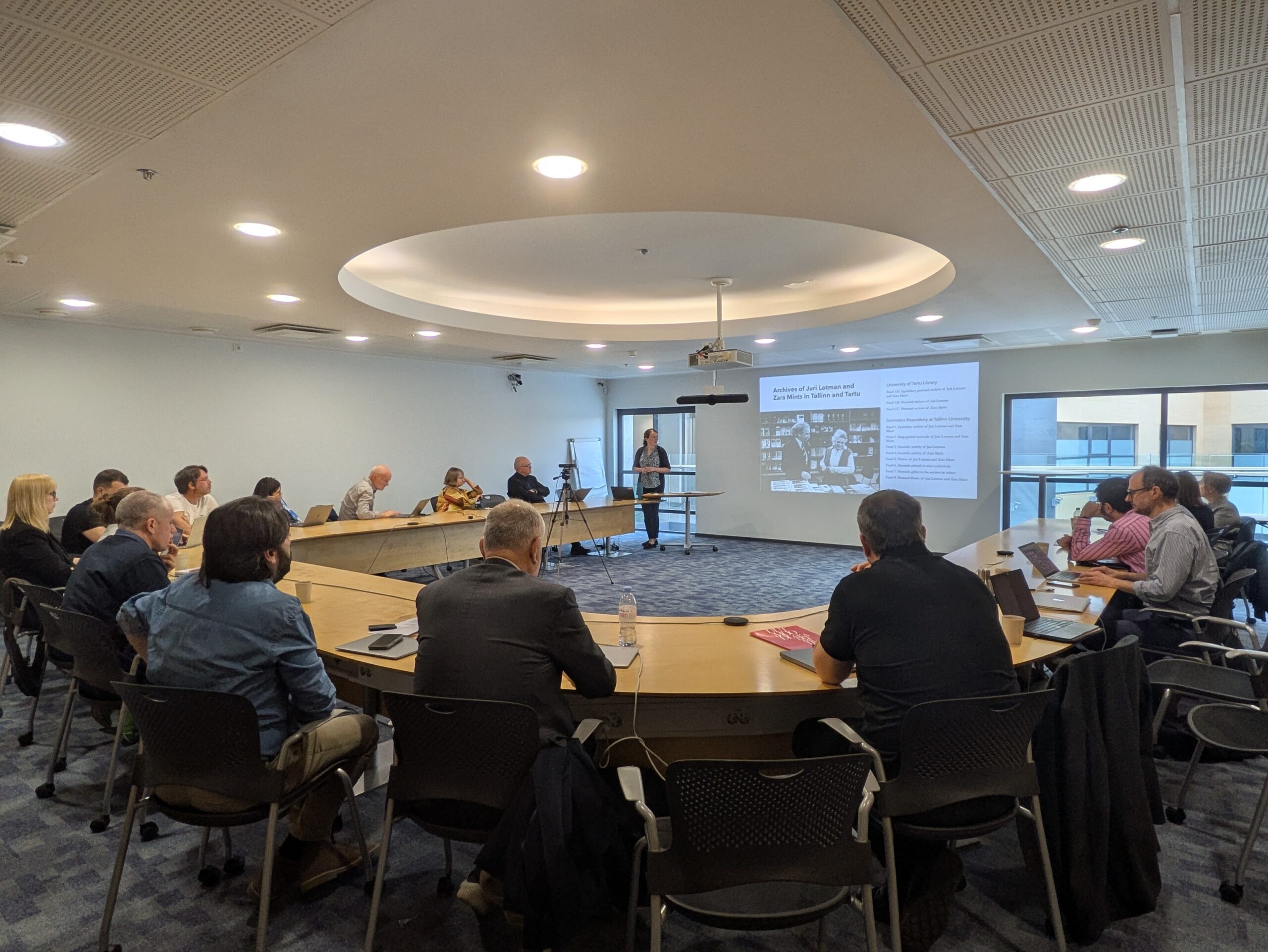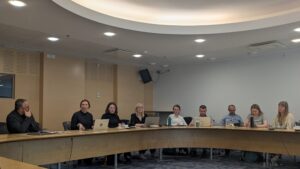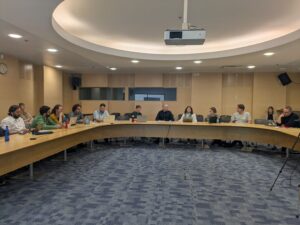 News
News
DIGHT-Net Research Seminar Report: “Beyond the Archive: Mapping the Future of Digital Cultural Heritage” June 4-6, 2025
June 18, 2025

On 4–6 June 2025, Tallinn University hosted the DIGHT-Net Research Seminar “Beyond the Archive: Mapping the Future of Digital Cultural Heritage.” Bringing together scholars and memory institution professionals, the seminar explored digital cultural heritage’s current state and direction. Through inspiration talks and presentations, the participants were encouraged to think across national and disciplinary borders. This stimulated conceptual and creative conversations pertaining both to the establishment of a new DIGHT-Net research hub in Tallinn University, to digital archives more broadly and specifically to DIGHT-Net’s development of the digital archive of Juri Lotman and Zara Mints.
After Prof. Marek Tamm (Tallinn University) opened the seminar, Prof. Daniele Monticelli (Tallinn University) probed the conceptual borders of what a ‘hub’ for digital cultural heritage might look like. Approaching the topic from different philosophical and practical viewpoints, his thought-provoking presentation opened the floor to the afternoon’s series of “inspiration talks.”
In the first round of inspiration talks, Alba Irollo (Europeana Foundation) outlined ongoing efforts to support young professions and educational initiatives in the field of digital cultural heritage. Christian Olesen (University of Amsterdam) introduced the CLARIAH Media Suite, an integrated platform for audiovisual collections of diverse institutes in the Netherlands. Ivan Kisjes (University of Amsterdam) highlighted the necessity of standardising datasets to face up to the manifold challenges of data preservation. Prof. Hannu Salmi (University of Turku) highlighted the conceptual ramifications of digital cultural heritage in terms of ontology, epistemology and methodology, challenging us to think of the unexpected ways wherein the digital and non-digital might intertwine in the future.
A second round of talks started with Johanna Lilja (National Library of Finland), who discussed the legal and infrastructural challenges of making collections digitally accessible and available for data analysis and training. Pille Runnel (Estonian National Museum) argued how digital heritage should be curated to both enable user engagement and allow the collection to function as a narrative powerhouse. Prof. Indrek Ibrus (Tallinn University) provided an overview of emerging digital heritage projects in Estonia, emphasising the importance of sustainability, interoperability, and standardisation across platforms.
 The day closed with a roundtable talk on the Estonian digital cultural heritage landscape, featuring Pille Runnel, Kristlyn Liier (The National Heritage Board of Estonia), and Eva Näripea (Estonian National Archives), and chaired by Marek Tamm. The discussion touched upon the different agencies involved in digital heritage, how digitisation changes remembering and knowledge transmission in diverse geopolitical contexts, and the ethics that both shape and steer the preservation of digital data.
The day closed with a roundtable talk on the Estonian digital cultural heritage landscape, featuring Pille Runnel, Kristlyn Liier (The National Heritage Board of Estonia), and Eva Näripea (Estonian National Archives), and chaired by Marek Tamm. The discussion touched upon the different agencies involved in digital heritage, how digitisation changes remembering and knowledge transmission in diverse geopolitical contexts, and the ethics that both shape and steer the preservation of digital data.
Opening the second day of the workshop, Prof. Ihab Saloul (University of Amsterdam) continued the discussion of ethics, agency and memory in relation to the digital archive, introducing the Dutch digitisation project of the Central Archive Special Jurisdiction as a case study to think about these issues.
Thereafter, Ivan Kisjes detailed the process of digitising an archive, taking The Desmet Collection as example. In doing so, he illustrated the necessity of training and combining multiple models when engaging with a collection, all the while drawing on both automated processes and human corrections. Christian Olesen continued discussing the same collection, illustrating how the CLARIAH Media Suite enables the critical analysis of audiovisual materials through annotation techniques and by connecting complex and dispersed sub-collections.
Johanna Lilja returned to introduce how sustainability informs the Finnish practice of digitising cultural heritage. Her talk illuminated the ecological, social and economic stakes of digitisation, advocating for thoughtful and high-quality policies to ensure continued sustainability of data practices.
In the afternoon, Alba Irollo discussed how the FAIR principles are made concrete in the “Collections as Data” movement. Her talk highlighted Europeana’s ongoing efforts to support data reuse, including the development of a workflow and datasheets, which foster awareness of data curation and encourage responsible reuse.
 The day concluded with a roundtable discussion, featuring the day’s speakers and chaired by Mila Oiva (University of Turku). The conversation asserted the necessity of seeing digital cultural heritage not only as data, but also as practice and process. The discussion then touched upon how to preserve the steps taken in the process of digitisation, likening it to an archaeological excavation. This also led to reflections on the inherent (de)contextualisation of the digital copy vis-à-vis its physical counterpart, and to what extent this is cause for concern: does digitisation mean fragmentation and loss, or is this part of the discourse of urgency and ecological, theoretical and conceptual crises that seems to inform today’s digital landscape?
The day concluded with a roundtable discussion, featuring the day’s speakers and chaired by Mila Oiva (University of Turku). The conversation asserted the necessity of seeing digital cultural heritage not only as data, but also as practice and process. The discussion then touched upon how to preserve the steps taken in the process of digitisation, likening it to an archaeological excavation. This also led to reflections on the inherent (de)contextualisation of the digital copy vis-à-vis its physical counterpart, and to what extent this is cause for concern: does digitisation mean fragmentation and loss, or is this part of the discourse of urgency and ecological, theoretical and conceptual crises that seems to inform today’s digital landscape?
The seminar’s third day focussed on the digitisation and research of personal archives. After an introduction by Hannu Salmi, Outi Hupaniittu (Finnish Literature Society) presented on the challenges of digitising collections that preserve elements of everyday life. Through examples of projects undertaken by the Society, such as the platform Elias Lönnrot Letters, she showed how attentive projects with rich metadata can be realised in private archives containing a great variety of materials.
Prof. Alois Pichler (University of Bergen) demonstrated the integration of generative AI into the digital research environment of Ludwig Wittgenstein’s Nachlass, called WittgensteinOnline. By showing the workings of different chatbots specifically developed for this collection, he clarified how generative AI can support philosophical inquiry while preserving source transparency.
Thereafter, Anneli Kivisiv (Arvo Pärt Centre) detailed how her institute works with the multifaceted and evolving collection of a composer and the legacy of his work. The Centre’s unique situation required the development of an information system specifically tailored to their collection, which connects source and media types in both the digital and physical archive.
Closing the seminar, Merit Maran (Tallinn University) provided an overview of the current challenges and future developments in building the archive of Juri Lotman and Zara Mints. Looking forward, challenges and opportunities may lie in the digital archive’s integration in education, its function in research and as an object of research itself, and how it can preserve the ambiguity and polyvocality present in its philosophical contents. In DIGHT-Net’s ongoing development of Lotman and Mints’ digital archive, the conceptual, technical, ethical, and collaborative issues raised during the seminar illustrate best practices and future needs in the curation of digital cultural heritage.
Marjolein Uittenbogaard
